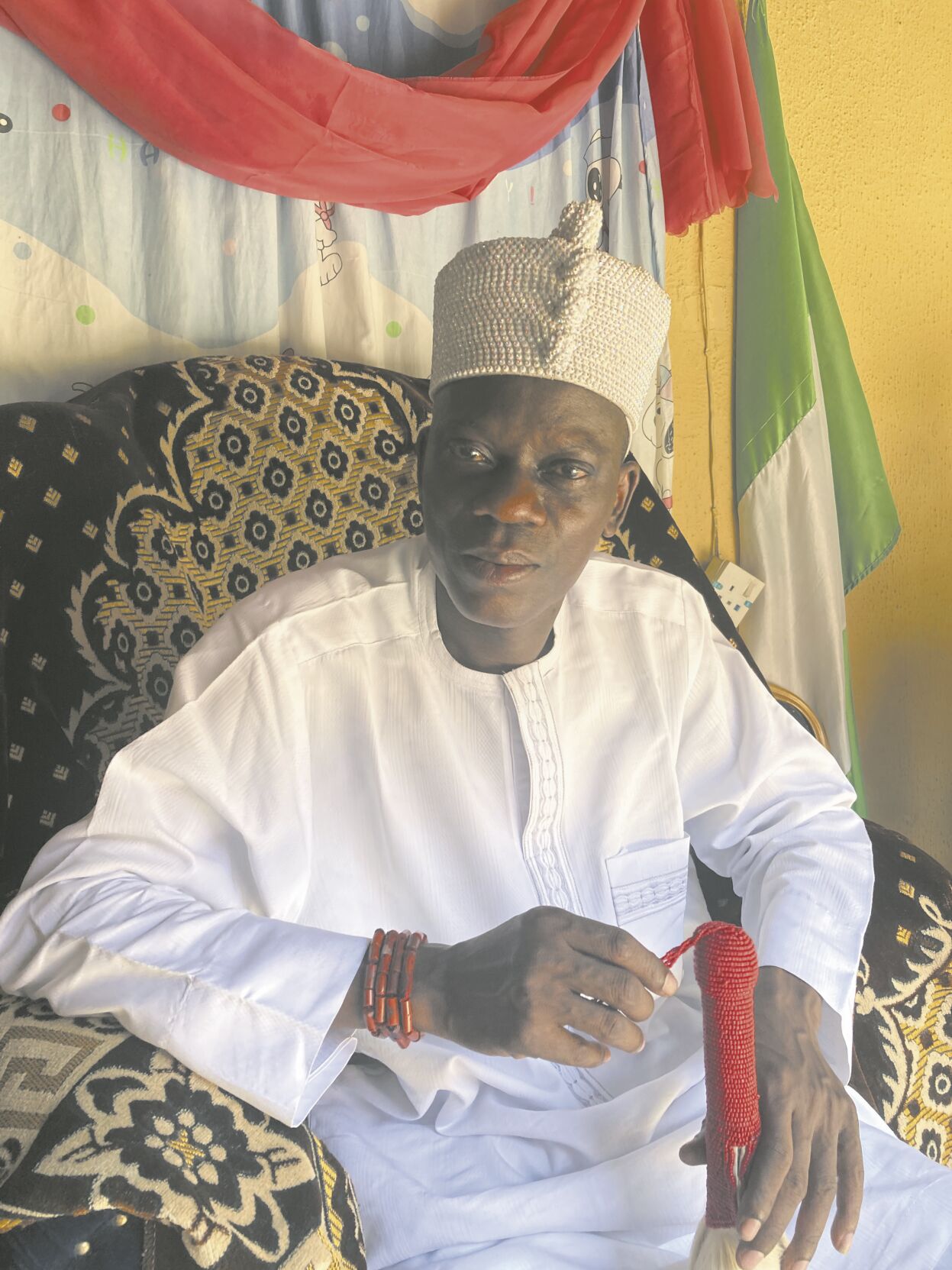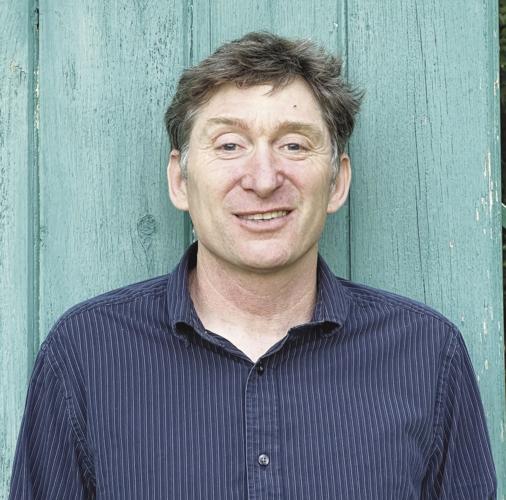Nigeria is very, very far away from the Lakes Region, and if you ask someone here what they know about that teeming West African nation, they’ll likely open with a lame crack about the Nigerian Prince Scam, an internet swindle that’s been thriving for about 20 years now. Saturday Night Live was already milking the Prince Scam for laughs back in 2009.
But did you realize that there are actual princes in Nigeria? And royal houses and high chiefs and kings living in palaces? In March, when a reporting trip took me to Nigeria’s Ondo State — it’s one of 36 states in a country of 227 million — I learned that in Ondo alone there are 100 obas, or kings. They’re holdovers from pre-colonial Nigeria, and they rule over what were, long ago, tiny independent states. They have no official political power, but they’re respected and they advocate for their people. When I was in Nigeria, I was intent on meeting a king, for I was curious: In what ways are Nigerian kings like our local selectboards? In their carriage, perhaps? In the scope of their duties and their regard for their citizens?
In a community called Isuada one afternoon, I approached the local palace and walked through the gate.
Was his royalty majesty, Joel Olufemi Adeluwoye, the Asuada of Isuada, available to talk?
The king’s secretary, Florence Adebayo, was not amused by my interview request. “The king is busy,” Florence said. She gave me her phone number, but there was no guarantee that I’d even live long enough to return to the castle. Along with a talented Nigerian photographer, Tom Saater, I was moving about Ondo in an extremely unreliable vehicle — a 2010 Toyota Tacoma driven by a 30ish guy named Peter. And I’d landed in Nigeria at a desperate moment in the country’s history.
Early in 2023, a corrupt strongman, Bola Tinubu, became Nigeria’s president after a rigged election that saw his thugs invading numerous polling places, scaring voters away. In office, Tinubu has printed money with abandon and borrowed profusely from international lenders so that inflation in Nigeria now stands at a staggering 33%. As Tinubu buys himself toys — a new yacht, a fleet of luxury vehicles — millions of poor Nigerians now have to work tiny scams just to get by.
Our driver, Peter, was scamming his boss, who owned the car. Before we set out on our Ondo adventure, the boss gave Peter $1.50 for steering wheel fluid. Peter elected to pocket the money, so that steering was, for him, a slow-motion grinding upper body workout, and often impossible. We didn’t slalom through Nigeria’s myriad potholes. No, we plunged deep into each back wrenching abyss, and meanwhile, in the front seat, speaking in Pidgin to Peter, Tom protested.
Tom: What if we can’t swerve to avoid an oncoming car?
Peter: Well, you and I will die, but Bill, in the back seat — he will survive. And he will pay to have my children educated at the best schools in Nigeria.
There were additional dangers. While I was in Ondo, The New York Times ran a story that described kidnapping as an “epidemic” in Nigeria. “Hundreds are feared seized,” read the headline. The abductions are most prevalent in the country’s northeast, the stronghold of Boko Haram, a jihadist insurgency with ties to ISIS, and we were far from there, in southwest Nigeria. Still, when we stopped in a community called Ogbese, a high chief there told us that the place sees 10 or 12 kidnappings a year. The kidnappers typically ask for about 3 million naira ($2,000) and farmers are most vulnerable. “They’re alone,” the high chief explained. “And almost always their families pay the ransom. If they don’t, after five or six days, they are dead.”
As we were leaving Ogbese, a brigade of six police officers pulled us over and asked Peter, our driver, for his license. Only then did we learn that Peter’s driver’s license was fake. He’d acquired it online for free, to bypass a $3 fee. The cops, who were wielding AK-47s, asked us to step down from the car. Then they sequestered us roadside for 45 minutes.
Would the equation have been as stark 800 years ago, when the kingdom of Isuada was just taking shape? I don’t know. But as our roadside stop transitioned from scary to boring, one thing became clear: The cops wanted money, and that money needed to come from my pocket. Eventually, I produced five 1,000 naira bills — about $3. The cops smiled, and soon we returned to the palace in Isuada.
Once again, Florence informed us that the king was not available. We exited the palace. But by now I knew that in Nigeria, even more than in the U.S., connections are everything. And, in doing interviews, I’d met a health worker who is good friends with the king. She called the king for me. Moments later, I was sitting beside the king’s throne, my tape recorder rolling as he clutched a beaded horsehair whip, an accoutrement that he uses to bless his subjects.
The king is a slender and elegant man, 44 years old and toned, thanks to a habit of moving about his kingdom on a bicycle. He was contemplative and careful in his diction. “A heartfelt welcome,” he said, “to the land of peace and prosperity. If I had more advance notice, I would have invited all of my chiefs to meet you.”
I asked how many chiefs he had.
“Almost 200,” he said. The interview continued.
How long have you been king?
Almost seven years.
How were you chosen?
Kings are chosen from the ruling houses [which are ancestral]. We have four ruling houses here in Isuada and seven kingmakers. When the race for king began in 2016, I showed no interest. I was working as an accountant. But my mommy told me that, when I came into this world, she knew I would be king. And everybody told me they wanted me on the seat of my forefathers.
What did they like about you?
I want to help the less privileged people in society. If I have five tubers of yam, I will prefer to eat one and give the remaining four out to the people.
Can you help me out as I try to gauge where you sit on the political spectrum? Do you favor Biden or Trump?
I give kudos to the present president of America.
But are you saying you’d vote for him? Or are you dodging my question?
[The king laughs.] Maybe later we can continue to discuss, but the present president, he is doing well. Let us give him the necessary support. He needs the support of his people. He cannot do it alone. A tree can never make a forest.
Tell me about this palace.
It has been here for over 800 years, and it is powerful. There is a room in this palace where, if a woman enters, she will never bear children again.
OK. But what are the biggest issues here in Isuada?
We need a police station. We only have a police post. The police come in the morning — that’s all. We need three full-time police officers because of the insecurity in the country.
Kidnappings, you mean?
Yes. In February, kidnappers killed two traditional kings in Ekiti state. They were returning to their palaces. The kidnappers attacked them on their way.
Who were the kidnappers?
We don’t know. They always cover their faces.
So, as a king, do you feel vulnerable?
I don’t want to say that. I believe in God.
Aside from security, what other issues are you facing here?
Our roads are in dilapidated condition. And the kidnappers, they like bad roads. When they take people, they always hide away in places that are hard to reach — in places where the roads are not good.
Our electricity supply is unstable. There are power outages every day. We are lacking. We are suffering. My people are crying. You see the BEDC [the Nigerian utility company] carrying ladders around to disconnect people from their lines. They will say the people didn’t pay. But they didn’t pay because the electricity was not there. At this moment, we have no power. If I want to watch television right now, I can’t do it.
The cost of petrol [gasoline for cars] has increased by more than 200% over the last two years. And when you increase petrol costs, the costs of all commodities will rise.
We need a better health center. If you go to our clinic now, the place is always jam packed — there is no bed space at all. And then we are trying to build a new palace.
How much will it cost to complete the new palace?
The estimate they gave me in 2022 was for 21 million naira (about $13,000). But that was when a bag of cement was 5,200 naira. Now it is 12,000 naira. We started construction in 2014, but now we have stopped. We are short on funds. We pray every day, but we don’t know where the money will come from.
After the king and I finished talking, an elder, 85-year-old Adedeji Elizabeth, stood and recited a prayer for us in the native Yoruba language. Then the king gave me a tour of the palace grounds. We walked through his current home, an ancient mud structure with sparely-lit corridors and a crooked staircase.
“It is dilapidated,” the king said. The half-constructed rooms of the new palace were a sadder sight, though. The cinder blocks were already darkening with age. Weeds sprouted up through the cracks, but the king remained serene and poised, immaculate in his white suit, and he pointed into the distance. “There,” he said, “is the Solar Bore Hole Water project, financed by the European Union. If we get it repaired, it will give us good drinking water.”
Eventually, we made our way over the cracked driveway toward the road, where Peter, the driver, was waiting for me. As we parted, the king shook my hand and, smiling, he said, “May God watch over you as you journey through the land of peace and prosperity.”
•••
Bill Donahue has written for Outside, Harper's, The Atlantic and The Washington Post Magazine. He lives in Gilmanton and is the author of "Unbound: Unforgettable True Stories From The World of Endurance Sports.” This column is adapted from his online newsletter Up The Creek.


























(0) comments
Welcome to the discussion.
Log In
Keep it Clean. Please avoid obscene, vulgar, lewd, racist or sexually-oriented language.
PLEASE TURN OFF YOUR CAPS LOCK.
Don't Threaten. Threats of harming another person will not be tolerated.
Be Truthful. Don't knowingly lie about anyone or anything.
Be Nice. No racism, sexism or any sort of -ism that is degrading to another person.
Be Proactive. Use the 'Report' link on each comment to let us know of abusive posts.
Share with Us. We'd love to hear eyewitness accounts, the history behind an article.